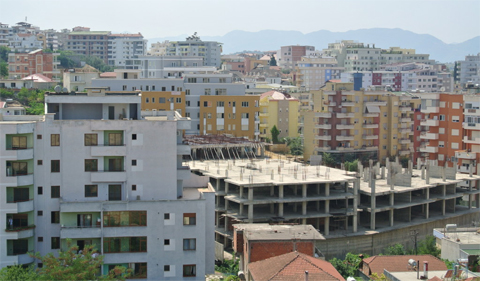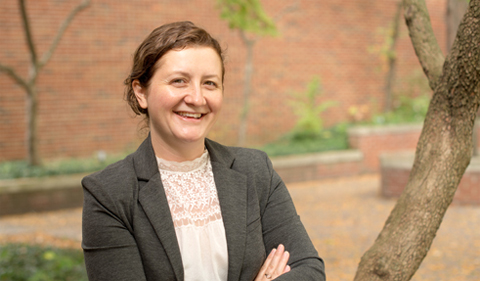By Katarina Hanifan ’20
This past summer, Dr. Smoki Musaraj, Assistant Professor of Anthropology, traveled to Tirana and Vlora, Albania for two months for an Ethnographic Research Project: Construction, Speculation and the Mediterranean Dream. This project was funded by the Ohio University Research Committee.
Musaraj presented her findings from this research at the annual meeting of the American Anthropological Association Meeting in Nov. 18-22 in Denver, CO: “Property, Law, and Speculation in the Making of a ‘Mediterranean Gem.'”
Her project looks at the economies, legal regimes, and social configurations that enable speculative construction projects across South and Southeast Europe.

Komuna Dajt is a district at the outskirts in Tirana that is experiencing rapid development of high-rises financed through klering (non-cash barter) practices. Komuna Dajt is one of the city’s areas with the highest volume of vacancies and incomplete construction projects due to a crisis in liquidity. This is also one of the areas of work of highest risk to subcontractors and construction teams who are paid in kind (in apartments) rather than cash.
During her summer research, Musaraj focused more specifically in the cities of Tirana and Saranda (Albania) to explore how the construction boom of the last decade has impacted various groups of people on the ground. She interviewed developers, subcontractors, and self builders to explore their practices of financing construction via formal lines of credit, informal credit practices, and remittance transfers.
Through these interviews, she learned more about the various ways of valuing homes and work, the use of particular kinship and friendship networks, and practice of klering (non-cash means of payment) that organize relations among these actors.
In addition, she interviewed appraisers and urban planners to further understand how the financing of construction is intertwined with unresolved property privatization schemes, with the politics of urban planning, as well as with demographic changes of the last two decades of massive internal and external migration.
Abstract: In the past decade, a construction boom has been a major driver of urban transformation in Albanian cities. Such change is particularly visible in the coastal cities of the southern Riviera, such as Vlora and Saranda, where sprawling concrete high rises have taken over the olive terraces build during the socialist regime. The proliferation of such concrete high rises, locally referred to as betonizim (concrete-ization), is fueled by speculative investment practices as well as fantasies of becoming the next “Mediterranean gem.” And yet, despite years of investment in construction, many of these buildings remain incomplete, threatening the burst of an impending housing bubble. In some cases, developers entrenched in non-liquid networks of debt (or klering) simply run out of cash; in others, developers are caught up in property disputes, as multiple parties claim ownership of construction sites. Looking at accounts from developers, subcontractors, and home-buyers, this paper explores how the intertwined logics of financial speculation and changes in property laws come together in the making of a construction boom (and its potential bust). I situate these intertwined logics within the specific history of postsocialist transformations as well as more recent legal reforms aimed at European Union accession. In particular, I draw attention to how the legal and cultural notions of property become a site of speculation and productivity in a context of ongoing economic and political marginality and change.




















Comments